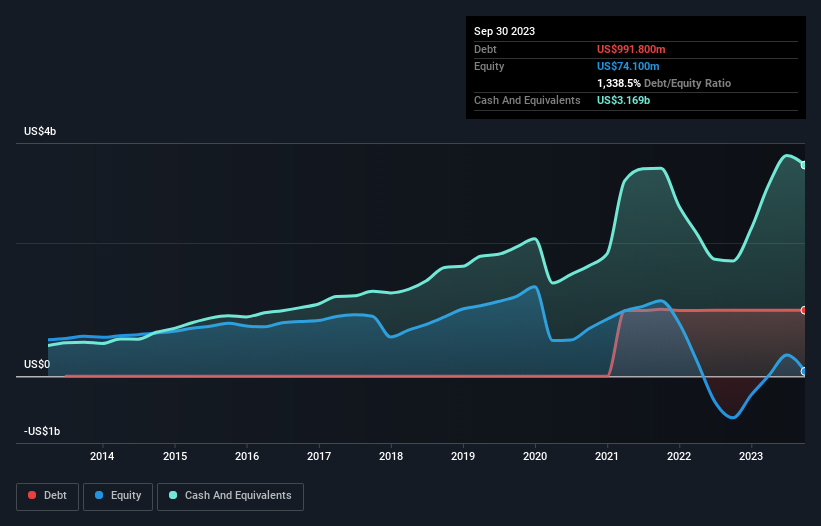Does Fortinet (NASDAQ:FTNT) Have A Healthy Balance Sheet?
The external fund manager backed by Berkshire Hathaway's Charlie Munger, Li Lu, makes no bones about it when he says 'The biggest investment risk is not the volatility of prices, but whether you will suffer a permanent loss of capital.' It's only natural to consider a company's balance sheet when you examine how risky it is, since debt is often involved when a business collapses. We can see that Fortinet, Inc. (NASDAQ:FTNT) does use debt in its business. But should shareholders be worried about its use of debt?
When Is Debt A Problem?
Debt is a tool to help businesses grow, but if a business is incapable of paying off its lenders, then it exists at their mercy. In the worst case scenario, a company can go bankrupt if it cannot pay its creditors. However, a more usual (but still expensive) situation is where a company must dilute shareholders at a cheap share price simply to get debt under control. Having said that, the most common situation is where a company manages its debt reasonably well - and to its own advantage. When we examine debt levels, we first consider both cash and debt levels, together.
View our latest analysis for Fortinet
How Much Debt Does Fortinet Carry?
As you can see below, Fortinet had US$991.8m of debt, at September 2023, which is about the same as the year before. You can click the chart for greater detail. But it also has US$3.17b in cash to offset that, meaning it has US$2.18b net cash.
How Strong Is Fortinet's Balance Sheet?
We can see from the most recent balance sheet that Fortinet had liabilities of US$3.65b falling due within a year, and liabilities of US$3.76b due beyond that. Offsetting these obligations, it had cash of US$3.17b as well as receivables valued at US$1.01b due within 12 months. So its liabilities total US$3.22b more than the combination of its cash and short-term receivables.
Given Fortinet has a humongous market capitalization of US$50.8b, it's hard to believe these liabilities pose much threat. Having said that, it's clear that we should continue to monitor its balance sheet, lest it change for the worse. Despite its noteworthy liabilities, Fortinet boasts net cash, so it's fair to say it does not have a heavy debt load!
On top of that, Fortinet grew its EBIT by 47% over the last twelve months, and that growth will make it easier to handle its debt. There's no doubt that we learn most about debt from the balance sheet. But ultimately the future profitability of the business will decide if Fortinet can strengthen its balance sheet over time. So if you want to see what the professionals think, you might find this free report on analyst profit forecasts to be interesting.
But our final consideration is also important, because a company cannot pay debt with paper profits; it needs cold hard cash. Fortinet may have net cash on the balance sheet, but it is still interesting to look at how well the business converts its earnings before interest and tax (EBIT) to free cash flow, because that will influence both its need for, and its capacity to manage debt. Over the last three years, Fortinet actually produced more free cash flow than EBIT. There's nothing better than incoming cash when it comes to staying in your lenders' good graces.
Summing Up
We could understand if investors are concerned about Fortinet's liabilities, but we can be reassured by the fact it has has net cash of US$2.18b. The cherry on top was that in converted 170% of that EBIT to free cash flow, bringing in US$2.1b. So is Fortinet's debt a risk? It doesn't seem so to us. Over time, share prices tend to follow earnings per share, so if you're interested in Fortinet, you may well want to click here to check an interactive graph of its earnings per share history.
If you're interested in investing in businesses that can grow profits without the burden of debt, then check out this free list of growing businesses that have net cash on the balance sheet.
Have feedback on this article? Concerned about the content? Get in touch with us directly. Alternatively, email editorial-team (at) simplywallst.com.
This article by Simply Wall St is general in nature. We provide commentary based on historical data and analyst forecasts only using an unbiased methodology and our articles are not intended to be financial advice. It does not constitute a recommendation to buy or sell any stock, and does not take account of your objectives, or your financial situation. We aim to bring you long-term focused analysis driven by fundamental data. Note that our analysis may not factor in the latest price-sensitive company announcements or qualitative material. Simply Wall St has no position in any stocks mentioned.

 Yahoo Finance
Yahoo Finance 
